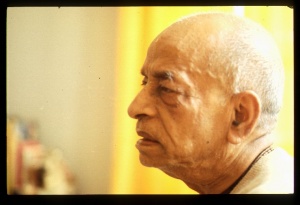SB 7.2.40

A.C. Bhaktivedanta Swami Prabhupada
TEXT 40
- pathi cyutaṁ tiṣṭhati diṣṭa-rakṣitaṁ
- gṛhe sthitaṁ tad-vihataṁ vinaśyati
- jīvaty anātho 'pi tad-īkṣito vane
- gṛhe 'bhigupto 'sya hato na jīvati
SYNONYMS
pathi — on the public road; cyutam — some possession dropped; tiṣṭhati — it remains; diṣṭa-rakṣitam — protected by destiny; gṛhe — at home; sthitam — although situated; tat-vihatam — struck by the will of the Supreme; vinaśyati — it is lost; jīvati — remains alive; anāthaḥ api — although without a protector; tat-īkṣitaḥ — being protected by the Lord; vane — in the forest; gṛhe — at home; abhiguptaḥ — well hidden and protected; asya — of this one; hataḥ — struck; na — not; jīvati — lives.
TRANSLATION
Sometimes one loses his money on a public street, where everyone can see it, and yet his money is protected by destiny and not seen by others. Thus the man who lost it gets it back. On the other hand, if the Lord does not give protection, even money maintained very securely at home is lost. If the Supreme Lord gives one protection, even though one has no protector and is in the jungle, one remains alive, whereas a person well protected at home by relatives and others sometimes dies, no one being able to protect him.
PURPORT
These are examples of the supremacy of the Lord. Our plans to protect or annihilate do not act, but whatever He thinks of doing actually happens. The examples given in this regard are practical. Everyone has had such practical experiences, and there are also many other clear examples. For instance, Prahlāda Mahārāja said that a child is certainly dependent on his father and mother, but in spite of their presence, the child is harassed in many ways. Sometimes, in spite of a supply of good medicine and an experienced physician, a patient does not survive. Therefore, since everything is dependent on the free will of the Supreme Personality of Godhead, our only duty is to surrender unto Him and seek His protection.